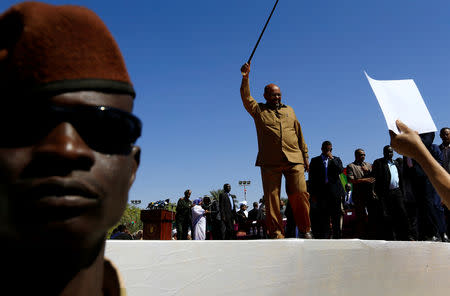Day into emergency rule, Sudan's Bashir names VP and prime minister
By Khalid Abdelaziz
KHARTOUM (Reuters) - Sudan's President Omar al-Bashir appointed a first vice president and a new prime minister on Saturday, a day after declaring a state of emergency that did little to halt street demonstrations, the most sustained of his 30-year rule.
Mohamed Tahir Ayala, the governor of Gezira state who was previously touted by Bashir as a potential successor as president, was appointed prime minister. Defence Minister Awad Mohamed Ahmed Ibn Auf, an ex-military intelligence chief, became first vice president while retaining his defence portfolio.
Bashir declared a one-year nationwide state of emergency on Friday and set up a caretaker administration. He replaced all state governors with military officials.
In his televised speech he urged his opponents to join a "path of national reconciliation" and dialogue. He called on parliament to postpone constitutional amendments that would allow him to seek another term in 2020, but he stopped short of saying explicitly that he would not run.
There was no sign Friday's speech had calmed the streets. Protests continued late into the night across the capital Khartoum. Stones and debris from burned tyres and branches littered many streets on Saturday.
The National Consensus Forces, one of the main opposition groups, said the state of emergency was aimed at countering a "popular revolution", and vowed to push ahead until he Bashir is toppled.
The National Umma Party, headed by Sudan's last democratically elected prime minister Sadiq al-Mahdi, who was toppled by Bashir in a 1989 military coup, sharply criticised the speech in a statement on Saturday.
"It was a contradictory speech and does not relate to the reality of the current crisis in our country in any way," National Umma, one of the main opposition parties, said. "It does not fulfil the least of the Sudanese street's demands."
Activists say nearly 60 people have been killed since the protests began more than two months ago, while authorities put the death toll at 32, including three security personnel.
Sudan last had a nationwide state of emergency in 1999. States of emergency had been declared in several states as protests intensified.
Security forces arrested Osman Mirghani, the editor-in-chief of prominent independent newspaper Al-Tayyar, late on Friday, his family told Reuters.
Mirghani appeared on regional broadcaster Al Arabiya Al Hadath and criticised Bashir's Friday evening speech. He then returned to Al-Tayyar's bureau where security forces detained him, his family said.
As he has faced mounting unrest at home, Bashir has sought support abroad from fellow Arab leaders. Bashir and Defence Minister Ibn Auf met on Saturday with the emir of Qatar's envoy Khalid bin Mohammed Al Attiyah.
Earlier this month, he struck a conciliatory tone towards the protests, saying that young people caught up in the recent turmoil had "reasonable ambition".
Bashir, an Islamist and former military officer, is wanted by the International Criminal Court in the Hague over charges of masterminding genocide in the Darfur region, which he denies. He has been lobbying for Sudan to be removed from a list of countries which Washington deems state sponsors of terrorism.
The listing has blocked the investment and financial aid that Sudan was hoping for when the United States lifted sanctions in 2017, economists say.
(Reporting by Khalid Abdelaziz; Writing by Yousef Saba; Editing by Robin Pomeroy)



